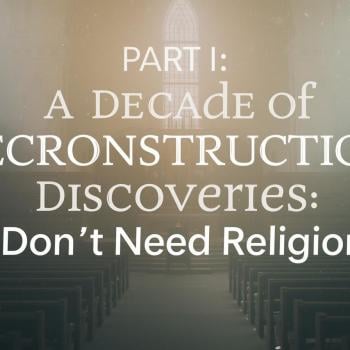 Dr. Larry W. Hurtado is Professor Emeritus of New Testament Language, Literature, and Theology at the University of Edinburgh, Scotland. He is also a Fellow of the Royal Society of Edinburgh. I know Larry. He was the lecturer in the 8th annual, two-day Kermit Zarley Lectures at North Park University in Chicago in 2008.
Dr. Larry W. Hurtado is Professor Emeritus of New Testament Language, Literature, and Theology at the University of Edinburgh, Scotland. He is also a Fellow of the Royal Society of Edinburgh. I know Larry. He was the lecturer in the 8th annual, two-day Kermit Zarley Lectures at North Park University in Chicago in 2008.
Larry Hurtado has specialized in writing books about early Christian worship of Jesus. He regards it as prime evidence that Jesus was God (high christology). Larry maintains that the early Jewish Christians “worshipped” Jesus at a very early date, certainly no longer than two decades after the Christ event (Jesus’ death, resurrection, ascension, and heavenly exaltation) and most likely during the first decade. Most historical-critical scholars have insisted that Jesus was not “worshipped” until beginning in the late first century AD or the early second century. Many of them also have claimed that Christians did not believe Jesus was God until the latter part of the first century.
In my book, The Restitution of Jesus Christ, I explain about Hurtado, “He describes the supposed early church transition from a low to a high Christology (“easily within the first decade of the Christian movement”) as an innovative and unprecedented “mutation in monotheistic devotion,” which results in a “binitarian shape of early Christian worship.” (A low Christology does not include belief that Jesus was God, and high Christology does and that he preexisted.)
Lexham Press just published a 96-page book by Larry Hurtado entitled Honoring the Son: Jesus in Earliest Christian Devotional Practice. In it, Larry summarizes all of his writings on early Christian worship of Jesus. His purpose is to reach a wider readership, thus general readers. I have not read this book, but I’ve read some of Hurtado’s previous books on this subject.
This month’s Review of Biblical Literature–the premier scholarly journal about the Bible–has a review of Hurtado’s Honoring the Son by Professor Yung Suk Kim from Virginia Union University. Kim writes, “The book’s central approach to Christian origins is worship or devotion rather than what early Christians believed about Jesus. Because of this approach, Hurtado examines worship in the ancient world (ch. 2), looks into ancient Jewish monotheism (ch. 3), explains how Jesus-devotion was possible (ch. 4), and presents examples of Christian devotional practice of Jesus (ch. 5). The conclusion is in chapter 6.”
Yet Hurtado’s entire enterprise about the supposed early worship of Jesus is that, as I stated above, this is prime evidence that the early Christians believed Jesus was God. Now, “worship” is a slippery term, especially in English. The traditional British marriage vow used to have the groom reciting to the bride, “I do worship thee.”
The word in the Greek New Testament that is most often translated “worship” in English Bible translations is proskuneo. (Latreuo is the other.) It refers to the physical act of either bowing the knee or lying prostrate before someone or some object, such as a king. This act of honor usually infers no more than respect. Thus, it does not necessarily mean the worshipper believed that person or object was divine.
Kim continues, “Chapter 4 argues that a ‘mutation’ took place among early Christians. On the one hand, they maintained the worship of God, as Jews did within their religion. On the other hand, Christians incorporated a new feature of worship, the worship of Jesus, into the traditional worship of God. Hurtado cites Paul’s letters as a way of supporting his argument for Jesus-devotion: Jesus is called Lord, as God is (Rom 10:9–13); he appears together with God in a worship setting (1 Cor 8:4–6); every knee will bow at the name of Jesus (Phil 2:6–11); he sits at the right hand of God (Rom 8:34). However, I am not convinced about Hurtado’s argument of the mutation theory, since early Jewish Christians were monotheists and could honor Jesus as the adopted son of God. A more natural understanding might be that Jesus was exalted as the Son of God but not as God or the same as God or with the same worthiness of God. Jesus’s exaltation may be considered worship if that is worship by definition. But in Paul’s language, his object of worship is clearly God, as he says in Rom 1:9a: ‘For God, whom I worship [latreuo] with my spirit by announcing the gospel of his Son.’
“. . . . In some sense, we may think Jesus was worshiped within the earliest years after his crucifixion, but the question is what sort of worship it is. It is questionable that Jesus was given the same degree of worship as God. Whatever title or characteristics were given to Jesus in Paul’s letters was to honor and praise him as the Son of God, not as the same as God.”
I think Professor Kim is right on. The early Christians honored Jesus as God’s Son in the sense that he was God’s agent par excellence, having an unprecedented relationship with God, but not as being himself God.
(See a list of 130+ posts about the Bible not saying Jesus is God by clicking “Christology” in the top bar at the homepage of Kermit Zarley Blog.)
















